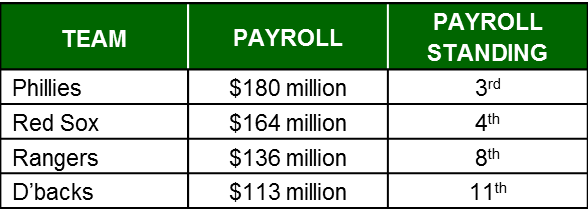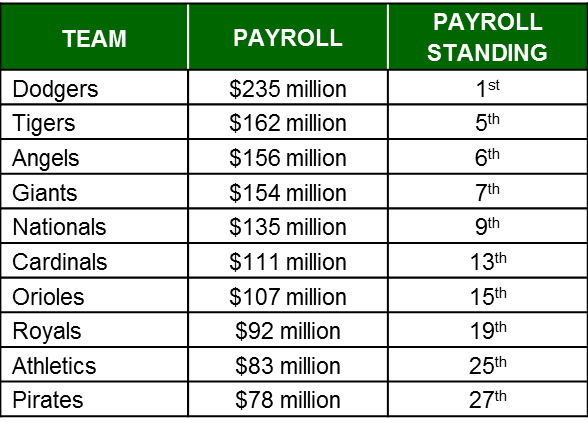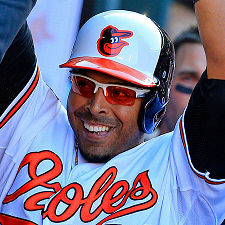WINNERS SPEND, LOSERS SPEND MORE
Sunday, September 28th, 2014When I encountered a fellow I know the other day, a baseball fan, I expected him to begin complaining about the Chicago Cubs, the team with which he grew up as a Chicago native. He has since moved elsewhere, out of the country, in fact, but he has taken his roots with him.
His love for baseball, that is, not for the Cubs. I quickly learned that he has forsaken the Cubs and now roots for the Cleveland Indians, the team from his wife’s home town.
“What happened to the Cubs?” I asked him.
“They don’t want to win,” he responded. “They don’t spend any money.”
The Cubs have finished in fifth place this season for the fifth consecutive season, averaging 69 wins and 93 losses per year.
My friend was right. The Cubs have stopped spending money. Their payroll this season was $89 million, their lowest since 2005, four years before the Ricketts family bought the Cubs from the Tribune Company.
The Ricketts eagerly and expensively recruited Theo Epstein to run their baseball operation at the end of the 2011 season, and three years later they continue to wait for results.
Having no interest in defending the Cubs and Epstein, I nevertheless understand their reluctance to add millions to a payroll that still couldn’t produce a winner. The Cubs figure that they will spend money when their good young prospects are ready for the majors.
Cubs’ fans, however, have reason to be skeptical of that strategy. Those plans fail at least as often as they succeed.
By slashing their payrolls from the $140 million level they had reached 2009-11, the Cubs avoid the wasteful spending other last-place teams experienced this season. It’s pretty remarkable how much teams can spend on players who are no better collectively than a last-place team.
Usually we look at the payroll standings to see how well low-paying teams fared, and we will do that. But first the last-place teams, the ones that spent so much to gain so little:

The New York Yankees, with their season-opening $204 million payroll, second highest in the majors, didn’t qualify for that group because they’re not finishing last, but they have the biggest payroll among the teams that failed to get to October baseball. In two successive seasons, the Yankees have spent $441 million with no post-season games to show for it.
How is that possible? Are the Yankees’ players so bad that they can’t win 85 games a year, or are the people picking the players so bad that they can’t find players who can win 85 games a year? A two-year total of $441 million?
Yet Hal Steinbrenner sticks to his anti-George position of not firing anyone, presumably determined to show he is not his father’s son. Hal, however, is too young to remember the start of the Yankees’ extended demise in 1965 (think of Horace Clarke, Jerry Kenney and Rich McKinney), and the Yankees could be facing a repeat of that period.
They certainly seem to be closer to that kind of period than they are to using their hefty payroll to return to October.
Of the 10 teams beginning the playoffs this week, five are among the top payrolls, three rank between 10 and 20 and two are in the bottom 10:

GIVE THAT MAN HIS BONUS
If the Minnesota Twins do not give Phil Hughes the $500,000 bonus he passed up by not pitching in the makeup of a rained out game he was supposed to start last week, they will not be the Twins I have come to know and admire.
In passing up the opportunity to pitch – he needed only a third of an inning to secure the bonus – Hughes was following the class act named Terry Ryan, the team’s general manager, who is recovering from squamous cell carcinoma.
In 2002, when Major League Baseball was discussing the possible contraction of the Twins and the Montreal Expos, Ryan, the Twins’ general manager, was invited to interview for the same job with other teams. He declined the offers, saying he owed it to his Minnesota employees to stay, in effect, with the ship until it went down if it was going to go down.
The Twins survived because, as it turned out, the threat of contraction was only a Bud Selig ploy in labor negotiations with the players. Nevertheless, Ryan didn’t know it was a ploy and genuinely opted to stay with his aides rather than jump ship for his own selfish purposes, probably the classiest act I have ever seen by a baseball executive.
That brings me back to Hughes, the Twins’ pitcher, who has restored his career after befouling it in seven seasons with the Yankees,
Hughes, who has a 16-10 record and a 3.52 earned run average, had already earned a pair of $250,000 bonuses on top of his $8 million base salary for pitching 180 and 195 innings. Another third of an inning to get to 210 would have meant an additional $500,000 bonus.
Hughes, however, encountered a rain delay and left one out short of his bonus. Manager Ron Gardenhire offered him another start, which he declined.
“I just didn’t think it was right,” Hughes told reporters. “If I were fighting for a playoff spot, I’d 100 percent be available. But given the circumstances, I don’t think it’s the right thing to do.
“I owe too much to this organization for the next two years to risk getting hurt for an incentive. For whatever reason it wasn’t meant to be. There’s a lot bigger problems out there. I’m proud of my season.”
In his 209 2/3 innings, the 28-year-old right-hander struck out 186 and walked 16, a remarkable strikeout-to-walk-ratio of 11.6 to 1.
The Twins don’t readily toss money around, but if they keep in character I feel they will give Hughes the bonus.
DAVE STEWART IT IS IN ARIZONA
In a move that was clearly visible on the horizon to anyone who was paying attention, the Arizona Diamondbacks have named Dave Stewart their new general manager.
Former player, coach, executive and player agent, Stewart finally has the job he wanted when the Toronto Blue Jays snubbed him in 2001 and sent him into the agent business.
He was the Blue Jays’ assistant general manager at the time so he knows his way around a baseball front office, but I wonder if his new front office will become a little crowded.
Tony La Russa, the Hall of Fame manager, is there as chief of baseball operations and was primarily responsible for the hiring of his four-time 20-game winner.
With Stewart, La Russa hired De Jon Watson, who was the Los Angeles Dodgers’ vice president of player development. With the Diamondbacks, he will be senior vice president of baseball operations. Singlehandedly, La Russa gave baseball’s lagging minority hiring practices a double jolt.
Not to be overlooked is Kevin Towers, whom La Russa fired as Arizona general manager but offered to retain him in the organization. Stewart, who worked under Towers in San Diego, said Towers has earned the right to be as involved as much or as little as he wants to be. Towers has not clearly indicated what that would be.
Given the Diamondbacks’ disastrous season – they had the majors’ worst record with the only winning percentage under .400 – they could use a lot of help, but when is a lot of help too much help?
They might need road signs in the Phoenix office to keep everyone from running into each other, beginning with their hiring of a new manager in the next few weeks.
FOOLISHLY FIXING FELIX’S E.R.A.
Major League Baseball officials just can’t keep their big noses out of events that occur on the field. Commissioner Bud Selig is obsessed with his legacy, and he apparently thinks that everything he does contributes to that legacy. There is such a thing, however, as going too far.
I recently wrote here that too much that affects games happens off the field, where fans don’t have visual access. The most obvious development there is instant replay. Hundreds of plays have been reviewed in a Manhattan office, far away from the sites where the plays occurred, and many have been reversed – safe to out, out to safe, double to home run, home run to double.
 Those plays, however, are not the only ones reviewed. Umpires review those calls. Joe Torre, the executive vice president of baseball operations, reviews officials’ calls.
Those plays, however, are not the only ones reviewed. Umpires review those calls. Joe Torre, the executive vice president of baseball operations, reviews officials’ calls.
Torre may do a great job at his task. However, fans and reporters have no way of knowing. He does his job in secret, and his decisions are seldom disclosed. They are kept secret.
Don’t ask me why. I don’t know, and no one has been willing to tell me. If members of the Baseball Writers Association were still serving as official scorers, as they did for many, many years, this ridiculous system would not be in effect.
Newspapers, though, ordered their reporters to cease scoring because it was a conflict of interest. It only took editors decades to figure that out (MLB was paying the reporters who covered it to be scorers), which gives you some understanding why newspapers are dying.
Now MLB recruits anyone who knows balls from strikes to serve as scorers, and their decisions are subject to review by Torre upon request from clubs or player agent via the union.
Official scoring calls do not determine the outcome of games so they don’t have the effect of umpires’ rulings on replays. However, they do have an effect on players. If Torre changes a call from an error to a hit or a hit to an error, it affects the pitcher’s earned run average or the batter’s batting average, maybe his runs batted in, too.
Here’s a recent example, which has triggered this rage. The headline told the story:
Scoring change gives Hernandez shot at ERA title
Upon request from the Seattle Mariners’ public relations department, Torre changed a hit to an error against Felix Hernandez, the team’s ace pitcher, and the change resulted in four earned runs that had been charged to Hernandez becoming unearned.
Now do you think the Mariners’ public relations department had a vested interest in getting Hernandez’s earned run average lowered? With Torre’s ruling, it dropped from 2.34 to 2.18, a smidge behind 2.17 for Chris Sale of the Chicago White Sox for the American League e.r.a. title. Sale was finished for the season while Hernandez was scheduled to start on the last day of the season.
Lloyd McClendon, the Mariners’ manager, who supported Torre’s decision – there’s another surprise – now had it within his grasp to get Hernandez the e.r.a. title. If the pitcher got five outs without giving up an earned run, McClendon could remove him from the game.
Hernandez would have a 2.169 e.r.a., Sale 2.172.
But not so fast. There was a major hitch in that plan. The Mariners needed to beat the Angels to have a chance for the A.L. wild card over Oakland, and the Mariners’ game was scheduled to start an hour after the A’s game at Texas. In other words, Hernandez was on his own, and his manager was looking for him to shut out the Angels anyway just in case Oakland lost.
Meanwhile, back on the scoring subject, if MLB feels a need to have a capacity to review scorers’ decision, name a committee of three veteran scorers or retired writers who had served as scorers and let them view the replays of the plays in question.
That might not be ideal, but it would keep the decisions in the hands of scorers and not MLB officials, especially former players, who might view plays differently from scorers.

 Uggla didn’t complete four seasons of his five-year contract, batting .209 for the Braves, only .161 before they released him July 20. He subsequently played four games for San Francisco, failing to get a hit in 11 at-bats before the Giants released him.
Uggla didn’t complete four seasons of his five-year contract, batting .209 for the Braves, only .161 before they released him July 20. He subsequently played four games for San Francisco, failing to get a hit in 11 at-bats before the Giants released him. Wren worked in the Braves’ organization for 15 years so it wasn’t a matter of his not knowing the system.
Wren worked in the Braves’ organization for 15 years so it wasn’t a matter of his not knowing the system.
 So are manager Buck Showalter and Duquette.
So are manager Buck Showalter and Duquette. The Orioles signed Cruz, as a free agent at the start of spring training when other clubs were reluctant to offer an expensive contract to a player who was suspended for the last 50 games of last season for a performance-enhancing drug violation.
The Orioles signed Cruz, as a free agent at the start of spring training when other clubs were reluctant to offer an expensive contract to a player who was suspended for the last 50 games of last season for a performance-enhancing drug violation. One way in which they were not alike was their view of the title general manager. Angelos didn’t like it, hated it, in fact. Steinbrenner had no problem with it. How could he? He was always talking about “firing my general manager.”
One way in which they were not alike was their view of the title general manager. Angelos didn’t like it, hated it, in fact. Steinbrenner had no problem with it. How could he? He was always talking about “firing my general manager.”